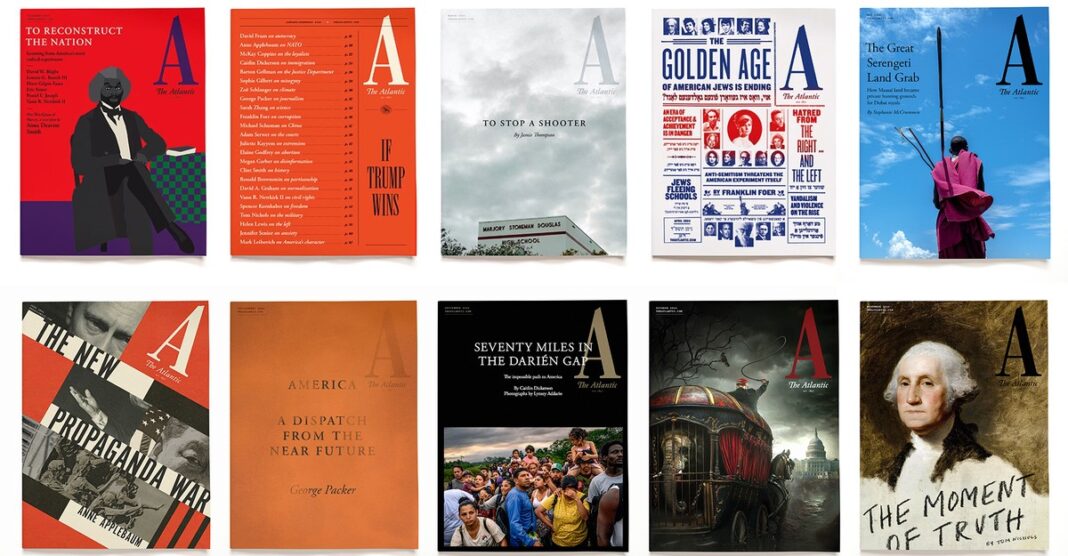The Atlantic is expanding its reporting and increasing production of its print magazine. For the first time in more than two decades, The Atlantic will once again publish monthly, beginning with the January 2025 issue (it has published 10 issues a year since the early 2000s). The Atlantic is also increasing coverage of defense, national security, and technology; and health and science, in addition to other areas of focus.
Editor in Chief Jeffrey Goldberg, in an email to The Atlantic’s staff shared in part below, wrote: “The decision to restore our print publication frequency to pre-internet levels was not made lightly, but it also seemed logical, given the strength and reach of our magazine, and the wide acclaim it receives. We believe that our readers, subscribers, and journalists will benefit from a return to monthly publication, and we believe that this move will benefit all of our platforms.”
He also detailed a new commitment to report stories at the intersection of national defense, technology, and global conflict. The Atlantic recently welcomed several new writers as part of an imminent expansion of its award-winning health and science reporting.
This past spring, The Atlantic reached 1 million subscriptions and profitability, surpassing two goals that the company set several years ago. Print continues to be a driver of that growth: Nearly half of all subscribers receive the print magazine, and it is one of the best-selling titles on newsstands.
Below is the announcement from Jeffrey Goldberg:
Twenty-two years ago, The Atlantic made the difficult decision to reduce the number of print issues published each year, dropping from 12 to 10, thus ending the run of what had been previously called The Atlantic Monthly. The rise of the internet, and The Atlantic’s incipient daily digital success, made this seem, I’m sure, like an obvious, unavoidable choice. But the history of our magazine is filled with improbabilities, and today, more people subscribe to our print magazine than at any time since its birth in 1857.
It is for this reason (among others) that we’ve decided to restore The Atlantic to monthly print publication, beginning in January. I’m fully aware of the broader, and depressing, trends in the magazine business, and in journalism generally. But The Atlantic continues to grow, mainly because the best editorial team in our industry produces excellent journalism every day, and because we get to work in partnership with the best business, advertising, circulation, and product teams in the country. The decision to restore our print publication frequency to pre-internet levels was not made lightly, but it also seemed logical, given the strength and reach of our magazine, and the wide acclaim it receives. We believe that our readers, subscribers, and journalists will benefit from a return to monthly publication, and we believe that this move will benefit all of our platforms.
This has been, so far, a very good year for The Atlantic. We crossed the million-subscription threshold; we became profitable again after running in the red for several years; we won our third consecutive National Magazine Award for General Excellence, something no other magazine has done in this century; and we’ve published stories of unparalleled impact and sophistication. But as I said earlier this year, I’ve never believed that resting on our laurels was an option, for more than a long weekend. We have a crucial mission, and we are in an unforgiving business, and so we have to continue to grow and innovate and outpace the competition each day.
As we increase our investment in the print publication, we’re also taking steps to strengthen our journalism across the board. As you all know, we recently committed to expanding the growth and reach of our health coverage, and three excellent staff writers have just started with us. One new initiative I would like to share with you today is a dramatic new commitment to report stories at the intersection of national defense, technology, and global conflict. We will share details of this new investment in the weeks to come, and my hope is that The Atlantic becomes the premier destination for readers in search of education and illumination in these areas. We are already an important source for the smartest coverage of technology, AI, and foreign policy; this new commitment will guarantee that we stay very far ahead of the pack. The Atlantic has a long tradition of journalistic excellence in these areas: Nathaniel Hawthorne was the magazine’s Civil War correspondent; Alfred Thayer Mahan invented the idea of a global navy in our pages; Martha Gellhorn covered World War II for The Atlantic; Einstein and Oppenheimer argued about atomic war in essays and articles; essays by Niebuhr, Du Bois, and Kennan, among others, changed and challenged conceptions of American power.
This requires a great deal of work and creativity on the part of every unit of this company, but I’m confident that our teams can meet the challenges ahead. Nick and I are already thinking about the sort of impact and reach The Atlantic will have when we acquire our two millionth subscriber.
We are all stewards of this great American institution, and I consider myself lucky to have colleagues who take this responsibility, and our mission, so seriously.


